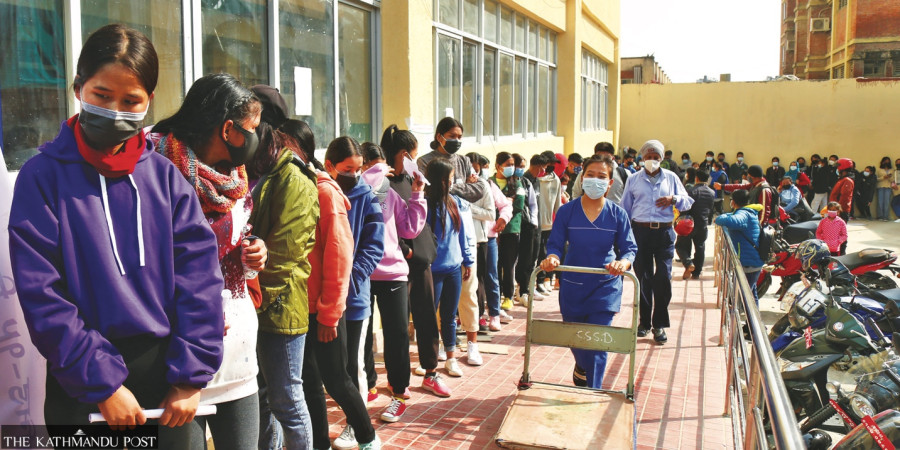Health
Government asks provinces, local units to ramp up vaccination amid falling public response to jabs
Public health experts stress efficient management of available doses and inoculation resources to boost vaccination coverage.
Arjun Poudel
In the rural areas of Makawanpur district, only around 35 percent people have so far taken the Covid-19 vaccine. But the vaccination rate in Hetauda, the headquarters of Bagmati Province is around 80 percent. And this is an assertion of Minister for Health and Population Birodh Khatiwada.
“Several wards have stopped the vaccination programme, after no one sought the service,” Khatiwada, told the Post. “Administering the jabs to those who have not taken any dose has become a challenge to us.”
With vaccination rates declining, the Ministry of Health and Population asks all provincial and local governments to speed up the vaccination pace.
“As per the analysis of the progress report of the vaccination as of now, pace of the vaccination drive has to be sped up in coming days,” reads a statement, issued by the Health Ministry.
The ministry in its statement said that it has been supplying Vero Cell vaccine to all provinces regularly and asked the agencies concerned to administer the jabs to people above 18 years by coordinating with the districts and local units.
The ministry has also directed agencies concerned to launch the vaccination campaign in the districts and local units, which have low vaccine coverage, administer the jabs to all people above 18 years old and give priority to pregnant women in vaccination after their first trimester.
The statement of the ministry comes, as more vaccines are set to arrive in the country within a few months.
The ministry said that over 34 million doses are in the pipeline and most are expected to arrive by the end of this year.
Public health experts said that internal management of the vaccine will be the next challenge and authorities need to make additional efforts to administer the jabs to those who have not taken any jabs so far.
“Earlier, we had a challenge to secure sufficient doses, which seems sorted out at present,’ said Dr Sarad Onta, a public health expert. “Success of the vaccination programme depends on a successful internal management.”
Several local units including those in Kathmandu Valley have stopped the vaccination programme, after very few people reach the immunisation centers for the services. Doctors say that it is the responsibility of the authorities concerned to provide jabs to all eligible citizens, whether they reside in the cities or far-flung villages.
“If the people do not come for the service, health authorities should reach out to the people, with services,” said Dr Shyam Raj Upreti, coordinator of the Covid-19 Vaccine Advisory Committee. “Otherwise, it is not possible to meet the target and get rid of the infection.”
Minister Khatiwada, agreed that administering the vaccine to those, who have not taken yet is not an easy task.
Experts, however, say that strong will power is the only thing necessary to bring all eligible citizens under vaccine coverage.
Every year the government inoculates 700,000 babies under 15 months
against various childhood illnesses. The same resources can be employed for Covid-19 vaccination programme.
Along with it authorities can also mobilize thousands of female community health volunteers, school teachers and social workers to help collect the data and encourage the people to take the shots.
Health Minister Khatiwada said that the ministry is launching a massive vaccination drive from Karnali Province.
“We will mobilise health workers, medical students and female community health volunteers, who will go door-to-door and vaccinate people,” said Khatiwada. “If the people do not come, we will go with the vaccine, and the vaccination booth will be set up in the places, where election booths were set up during the election to give access to the people, who cannot walk all the way to the health facilities.”
Nepal aims to administer Covid-19 jabs to all eligible populations by mid-April next year. It needs to vaccinate around 78 percent of its 30 million population—or around 25 million people, as per the government’s new plan that also includes those aged between 12 and 18 years. The government earlier planned to vaccinate only those aged 15 years and above.
Since around 4-5 million Nepalis are said to be living abroad, around 19-20 million people need to be vaccinated. For this, the country needs a little over 40 million doses of double-shot vaccines.
Nepal launched its vaccination drive on January 27 last year, becoming one of the first countries to inoculate its population against Covid-19. The campaign was kicked off after India gifted 1 million doses of Covishield, the AstraZeneca type of vaccine manufactured by Serum Institute of India. Nepal also paid for another 2 million doses, but after supplying half of the order, Serum expressed its inability to deliver the doses citing vaccine shortage in India, which was hit by a second wave. The remaining doses were shipped only recently on October 9.
With the government failing to secure doses, the vaccination campaign was hit hard. However, the jabs started to arrive again after countries like China, Japan, Bhutan and the United States started shipping the consignments. Nepal has also received vaccine doses from the Maldives.
As of Monday, 11, 500 people have died of Covid-19 across the country since the pandemic began.
So far, 7,990,190 people (26.3 percent of the total population) have been fully vaccinated in the country. Nepal has received 23,163,930 doses of Covid-19 vaccines—Vero Cell, AstraZeneca, Janssen and Pfizer-BioNTech.




 11.84°C Kathmandu
11.84°C Kathmandu















